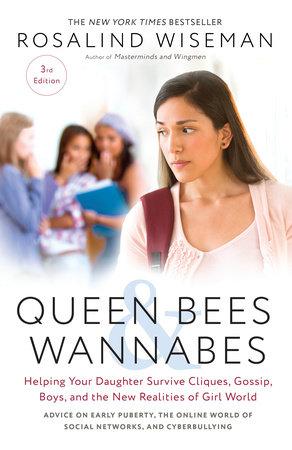What Should You Say When Your Child Tells You They’ve Been a Bystander to Bullying?
by Rosalind Wiseman
Did that person really just do that? What should I do? Maybe it wasn’t that bad … I should just pretend it didn’t happen.
All of us have been a bystander to bullying at some point in our lives.
These situations are so hard, no matter how old we are. Yet we often don’t admit how difficult it truly is to act — as if it’s easy to speak out against bullying, and do so effectively. But it’s a very complicated process: Our brains make a series of complex decisions that we usually don’t have time to articulate, even to ourselves and, before we know it, we’ve reacted to the situation. We’ve pretended to ignore what happened, laughed it off, or backed up the person being mean. Or we’ve stayed neutral and “stayed out of it” — which certainly doesn’t look neutral to the target.
When you’re a child or a teen, it’s even harder to act because it can feel like the bully has enormous, almost mythological power over you. It feels like if you speak up, your life will be over because every friend will abandon you. The children and teens I work with have told me how complicated the decision of whether to speak out or not can be. Choosing when they intervene typically depends on how well they know the person. If it’s at school and they see it going on with a group of people who aren’t their friends, they think it would be weird to intervene. After all, they could be misinterpreting what happened and, if it was really that bad, wouldn’t one of the kids who knows the situation better do something about it?
Adults can’t gloss over how hard this is when we try to encourage kids to speak out against bullying, or ask them a million questions about what they did in the moment and tell them what they should have done instead. Remember: If you weren’t there, you don’t know how hard it was.
There are two different kinds of bystanding: when you see it in the moment, and when you are witness to a pattern of behavior that you don’t agree with. The first demands split-second decision making. The second gives you some time to prepare what you want to say, to whom, and where you’ll say it.
At some point every kid will be a bystander. So before they’re even in that situation, it’s important for them to stop and think about what’s the theoretical minimum they’d want to do. Pull the victim away? Distract the bully? Tell them to stop? If so, what’s the most general, realistic thing they can visualize saying?
The reality is that usually bystanders don’t figure out what they should have said until after the moment passes. Here’s what I tell young people to keep in mind about bystanding:
It’s never too late. If you don’t handle the situation in a way you feel proud of, you can always go back and address it later. Here’s what you can say to the bully: “Yesterday when you said X to that person, it was wrong. I didn’t say anything when it happened because I was surprised and unprepared, but I want to tell you now.”
It’s always hard and uncomfortable. No one wakes up in the morning looking forward to telling someone they’re wrong. That doesn’t mean it’s okay to stay silent, but it does mean it’s critical to acknowledge that it takes a lot of courage to tell anyone you don’t like something they did.
People don’t always laugh when they think something is funny. Sometimes people laugh when they’re nervous or uncomfortable. But you can always go back and tell the bully later, “I laughed yesterday when you did X, but I laughed because the whole thing made me nervous. I didn’t think it was funny. That kid really didn’t like it.”
You can talk to the target. You can always apologize to the target for not handling it the way you would have wanted. At the very least, talking to the target about it tells them they aren’t alone. And maybe you can brainstorm together how you want to handle it if it happens again.
Getting involved doesn’t depend on how much you like the person. Speaking out when someone is being bullied shouldn’t be based on how you feel about the target or the bully. Getting involved should be based on whether someone’s dignity isn’t being respected. If that’s happening, bystanders need to speak out.
Sometimes it can be too dangerous to intervene all by yourself. If you are in a situation where your physical safety is at risk, you should go get an adult to help. Before you run off to find a grown-up, stop for one moment to think about where the closest adult is. You want to run towards help and safety as quickly as you can — and that one moment of thinking where to go can make a huge difference.
No matter what, somewhere along the line we will all be bystanders so we all need to have some empathy for each other. We can only encourage others to speak out when we collectively support one another.

